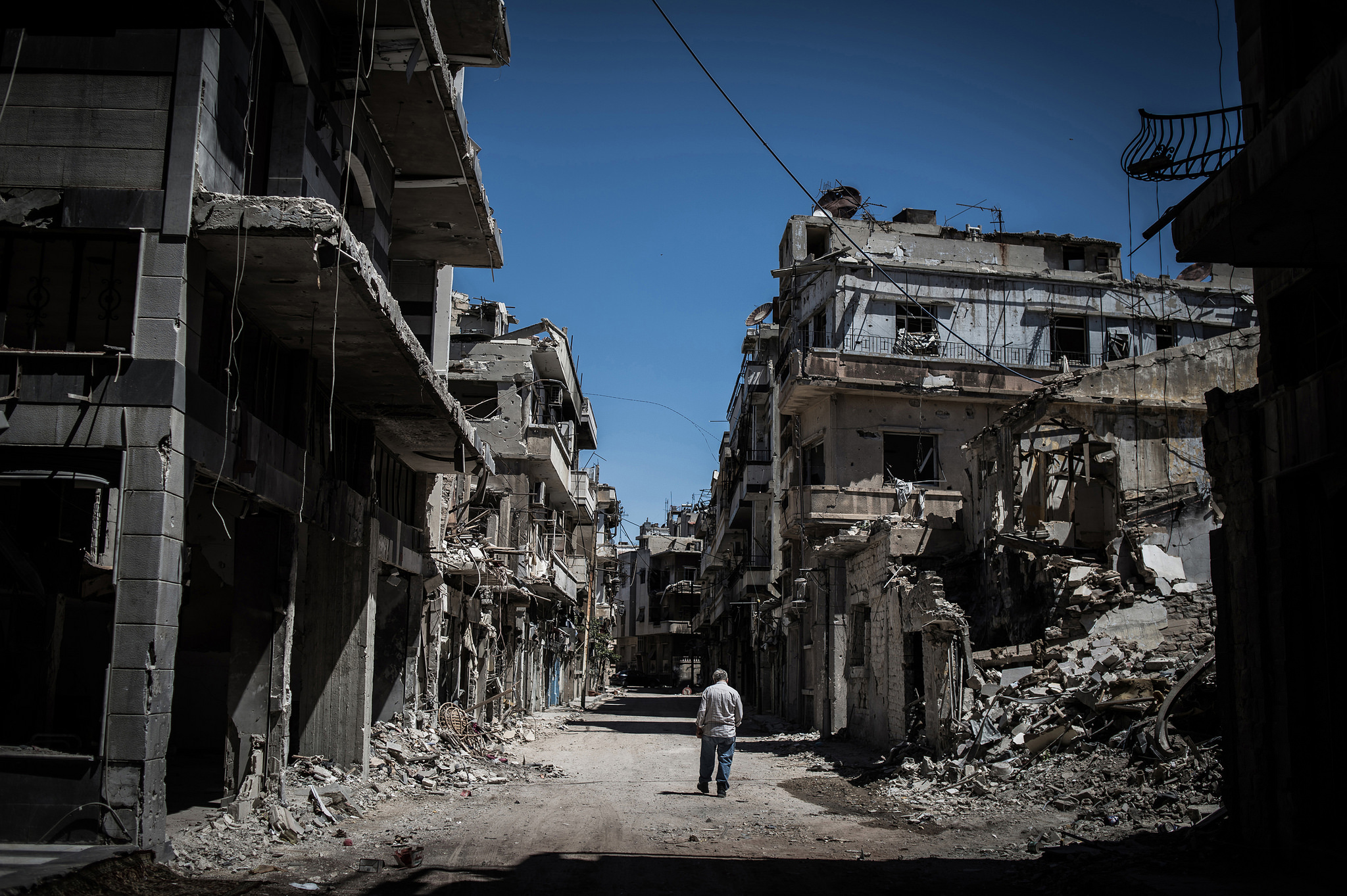Image caption: A Syrian refugee walks among severely damaged buildings in downtown Homs, Syria, on June 3, 2014. (Photo: Flickr/Xinhua/Pan Chaoyue)
International law experts, officials and NGO’s met in The Hague Thursday to help set up an new United Nations body to gather evidence of war crimes in Syria to ensure possible prosecution at a later date.
The new body called the International, Impartial and Independent Mechanism (IIIM) for Syria is “to serve as a hub for gathering evidence for all crimes in Syria”, said Dutch Foreign Minister Bert Koenders who hosted the meeting of over 150 professionals.
There are already many different NGO’s who are gathering evidence about Syrian crimes on all sides encompassing millions of pages and gigabytes of evidence [IJT-169 and interview]. Instead of doubling the work already done the U.N. mechanism aims to “collect and preserve all the available evidence in one place” and set standards for how the proof is collected and stored so there can be “swift prosecutions once the time is right”.
Helping set standards for evidence gathering
At the moment standards and procedures for collecting and storing evidence vary between the different organisations the hope is that the new UN body will give a push for “collaborative development of standards” said former US war crimes ambassador Stephen Rapp [IJT-186 and story].
Rapp, who is involved in many different initiatives to ensure prosecution of Syrian war crimes, said the mechanism will certainly make evidence gathered by NGO’s “more useful” for future prosecutions. The former Sierra Leone Tribunal prosecutor is on the board of the Commission for International Justice and Accountability (CIJA) which has already assembled a million-name database with possible perpetrators of war crimes and tries to prepare trial-ready cases for any future tribunals [IJT story]. But he concedes each organisation that collects evidence has a certain bias just from the collaborators it has.
“There are always gaps,” he said, but the UN body could bring all the evidence collected so far by different organisations together and assess how it can be used. It can also help train NGO's about the type of evidence needed.
For example for prosecutors evidence just showing mass crimes is not enough to try a case; what is needed in international tribunals to get the highest-ranking officials is so-called linkage evidence. Such evidence can link the most responsible perpetrators to the specific crimes as they are generally ordered by the higher-ups and carried out by those lower in rank. For that you often need to see records of orders, command structure and more administrative proof.
Rapp dismissed fears that the UN mechanism would potentially direct donor money away from the organisations already collecting evidence.
“This mechanism keeps the momentum going for accountability in Syria,” he said.
According to estimates the mechanism will need about 13 million euros in the first year and so far states have pledged 4 million euros. In addition it will need structural funding to keep going after that.
“There are limited resources and maybe some governments will be less inclined to give to other initiatives if they have just made a big donations to the UN mechanism but my message to them is 'if you want the mechanism to succeed they need active organisations to support them,” Rapp said. It is obvious to him that the mechanism will not be able to gather evidence itself in Syria and they will need the organisations already on the ground to supply them with evidence.
But he sees that the new body will need to manage expectations about what it can and can’t do. “The tough issue for the mechanism now is to ‘right-size’ expectations because this will not lead to prosecutions of people who will go to jail tomorrow. It will take a long time,” he said.
He is optimistic that prosecutions will eventually take place.“When you build the evidence it is hard for states to ignore,” Rapp said.
He points to other situations where essentially a similar office of the prosecutor in exile was set up at the international level in the case of the Hariri murder in Lebanon [IJT-175] and the war crimes allegations involving high ranking KLA commanders in Kosovo eventually resulted in the Special Tribunal for Lebanon and the Kosovo Specialist Chambers [IJT story] both seated in The Hague.
by Stephanie van den Berg, The Hague (The Netherlands)
